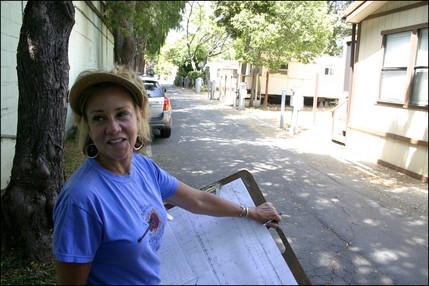
CITY HALL — A resident of a local trailer park has filed a $5.15 million claim against City Hall, alleging that the preliminary approval of a development agreement for the 2800 block of Colorado Avenue will deprive him and other tenants of their homes.
The claim, filed Aug. 10 by Michael McKinsey on behalf of himself and “others similarly situated,” alleges that City Hall violated the law and its own land use policy by approving the development of the land adjacent to the Village Trailer Park and signing the eviction notices of the remaining tenants.
He also named the Rent Control Board, but attorney Michaelyn Jones said that the board had not yet received the claim.
It’s unclear exactly how many of the 51 remaining residents stand behind the claim.
The Village Trailer Park falls in the Mixed Use Creative District, established by Santa Monica’s 2010 Land Use and Circulation Element (LUCE), along with two other major developments that currently have development agreements in front of the City Council — Colorado Creative Studio’s development of a future home for Lionsgate Entertainment and the Roberts Center business and housing development next door.
The Lionsgate headquarters project moved through its first reading in front of a four-member City Council on July 26, and will likely be approved at its next meeting on Aug. 23.
That’s problematic, said Brenda Barnes, McKinsey’s mother, resident of the park and former attorney with the Rent Control Board, because the approval could mean tacit approval to allow the trailer park’s owner, Marc Luzzatto, to convert the park into a mixed-use complex and evict the tenants.
According to the claim, that district requires that 50 percent of the total development there be comprised of housing, and because the Lionsgate headquarters would have no housing component, the burden to provide the district’s housing quotient would, de facto, fall on the shoulders of the proposed development where the park currently stands.
“We hope to stop this illegal development,” Barnes said. “Lionsgate is illegal, and the reason we care is that it affects us. If they’re short of housing they need, the only place they’re going to get it is to approve extra housing at the Village Trailer Park.”
City Council member Kevin McKeown agreed that the approval could reduce the protections he and the rest of the council worked into the LUCE to encourage the three developers to work together to try and preserve the park.
“Preserving existing occupied affordable housing is a core policy for our city. Concern for the seniors at Village Trailer Park was written into the LUCE, adopted last summer by unanimous vote of all seven council members,” McKeown wrote in an e-mail. “Unfortunately, the separate DA for the Lionsgate project, approved last month with only four of seven council members present, reduces our leverage to get the three adjacent property owners to cooperate, meaning our options for saving Village Trailer Park have been significantly reduced.”
McKeown was not present at the council meeting.
While city officials will not comment on the actual complaint, the 50 percent rule in the LUCE doesn’t hang on these three projects, said David Martin, the interim director of the Planning Department.
“What the LUCE talks about in the Mixed Use Creative District, which is the broader area that includes these three but is a much larger area, should be 50-50 balance of housing and commercial,” Martin said. “It’s not project-specific … and not these three projects combined.”
The complaint further alleges that the proposed Lionsgate development is too dense for the area, and that the community benefits currently under consideration — a community room, improvements to the nearby future light rail station and sidewalk improvements — are “trivial to the point of ludicrousness,” and not in line with the requests of the community.
Barnes hopes that the claim will put the brakes on the development agreement proceedings for the Village Trailer Park land by forcing City Hall to deny the claim, leading them to sue officially for damages.
If City Hall does not deny the claim, Barnes said, she and McKinsey can move forward with a preliminary injunction, which would still halt the project.
That project, as proposed, would include an environmentally-friendly mixed-use development including 240 condominiums, 109 apartment units and approximately 181,800 square feet of commercial and retail space, according to the Planning Commission caselist.
That agreement has been on hold since 2006 while City Hall tried to work with the developer to find a way to make accommodations for the residents of the park, who will be displaced if the development goes forward. Now, it seems to be getting underway again.
A consultant hired by City Hall and paid for by the developer is conducting the studies needed for an environmental impact report, which is necessary for a development agreement with City Hall, Martin said.
Tuesday, consulting arborist Cy Carlberg and a small crew from her independent, Santa Monica-based company were surveying the Village Trailer Park, cataloguing trees for the EIR, Luzzatto confirmed.
ashley@www.smdp.com
Managing Editor Daniel Archuleta contributed to this report.








